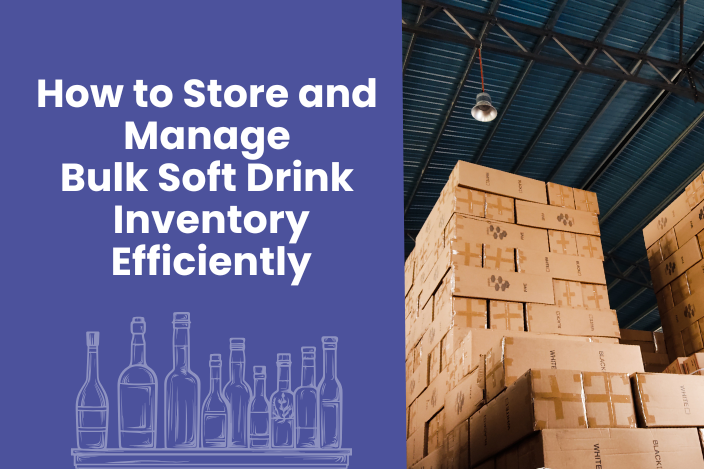
How to Store and Manage Bulk Soft Drink Inventory Efficiently
Managing bulk soft drink inventory efficiently is essential for any business in the food and drink sector — whether you operate a supermarket, convenience store, restaurant, or wholesale warehouse. Effective inventory management ensures product freshness, reduces waste, saves space, and helps maintain customer satisfaction.
In this guide, we’ll explain how to store soft drinks in bulk, avoid common stock issues, and streamline your storage systems. If you're sourcing drinks at wholesale prices, we'll also link you to a trusted supplier in the UK with a wide product range.
1. Evaluate Your Storage Space Before Ordering
Before you begin ordering large quantities of soft drinks, assess your current storage facilities.
Ask yourself:
Is the space dry, clean, and well-ventilated?
Is there sufficient shelving or racking to support the volume?
Can staff easily access fast-selling items?
If your business orders drinks from a UK wholesale drink supplier, it’s important that you plan ahead to avoid overcrowding or spoilage. Soft drinks are typically bulky and may include a mix of cans, PET bottles, and glass bottles, which require proper handling and separation.
2. Follow the FIFO Method
To minimise waste and ensure freshness, implement a First-In, First-Out (FIFO) inventory system.
Here's how:
Always place newer stock behind existing items.
Clearly label stock with the date of arrival or expiry.
Use colour-coded stickers or labels for faster identification.
This method ensures older stock is sold first, reducing the risk of expired products reaching your shelves.
3. Monitor Ideal Storage Conditions
While most soft drinks are shelf-stable, they still require specific conditions to retain taste and packaging integrity.
Recommended storage guidelines:
Store at room temperature (10°C–25°C)
Keep away from direct sunlight and heat sources
Avoid exposure to freezing temperatures
Ensure the area remains dry and odour-free
For best results, avoid storing soft drinks near strong-smelling products like cleaning agents or spices, as this may affect flavour through plastic packaging.
4. Organise Inventory by Category and Sales Volume
Efficient organisation can significantly reduce restocking time and prevent stock loss.
Consider grouping your inventory by:
Brand (e.g. Coca-Cola, Fanta, Pepsi)
Type (e.g. regular, sugar-free, energy drinks, juice drinks)
Packaging (cans vs bottles)
Popularity (fast-moving vs slower lines)
This approach is especially helpful if you stock imported beverages or Asian soft drinks such as Ramune soda, Thai tea drinks, or fruit-flavoured options, available through trusted suppliers like JK Foods UK.
5. Use an Inventory Management System
Manual tracking can lead to errors, especially in high-volume environments. Use an inventory management system to automate the process.
Features to look for:
Real-time stock tracking
Expiry date notifications
Reorder point alerts
Integration with your POS or e-commerce system
Customisable reports
This enables you to plan restocks, monitor product movement, and reduce over-ordering — which is especially important when managing perishable goods.
6. Schedule Deliveries According to Sales Trends
Avoid ordering more than you can store or sell. Analyse your sales patterns and set delivery schedules that align with high-demand periods.
If you're working with a reliable wholesale supplier like JK Foods UK, you'll benefit from:
Consistent delivery timelines
Bulk order discounts
A wide variety of chilled and ambient drinks
Flexible support for your restocking schedule
This helps ensure your stock levels remain healthy without creating storage issues or product waste.
7. Train Staff on Stock Handling Procedures
Your staff play a crucial role in inventory management. Make sure your team knows:
How to follow the FIFO system
Where each type of drink is stored
How to log stock movement (digitally or manually)
What to do when products are damaged or expired
Good training reduces errors and increases operational efficiency — particularly when managing high-turnover items like soft drinks.
8. Conduct Regular Stock Audits
Finally, set a schedule for routine stock audits to ensure everything matches your records.
Include:
Weekly visual checks for low or misplaced stock
Monthly counts to compare with system reports
Quarterly reviews of best-selling and underperforming products
This allows you to identify fast-moving lines and adjust your orders accordingly. For businesses stocking international or niche beverages, this also helps you respond to shifting consumer demand.
Why Your Supplier Choice Matters
Your inventory system is only as good as your supplier. Working with a reliable wholesale drink partner ensures consistent stock quality and delivery timing. If you're looking for authentic soft drinks — including Asian, Japanese, Thai, or Korean varieties — explore the full drinks category at JK Foods UK.
JK Foods is one of the UK's most trusted importers and distributors of oriental food and beverages, offering competitive pricing, reliable delivery, and a diverse product catalogue.
Final Thoughts
Managing bulk soft drink inventory doesn’t need to be complicated. By implementing proper storage techniques, using digital inventory tools, and partnering with reliable suppliers, you can reduce waste, maintain product quality, and run a more efficient operation.
Whether you're stocking mainstream brands or niche Asian drinks, the key is planning, organisation, and consistent monitoring.
For a wide range of soft drinks, including popular Asian imports, visit JK Foods UK’s drink section to find the right stock for your business.
